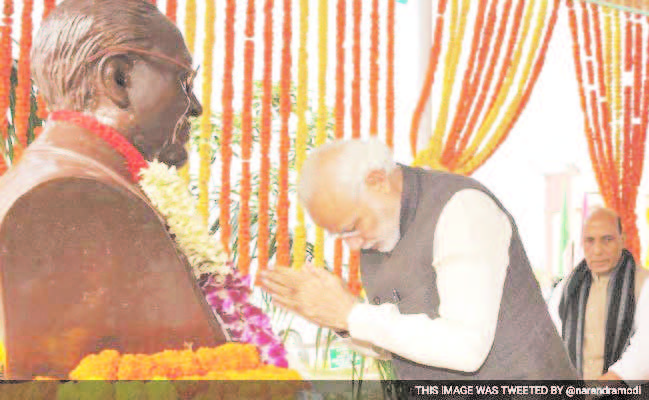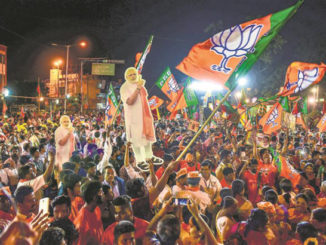
Yesterday, April 14, we did Baba Saheb. And did him copiously. The Prime Minister was at some place in Madhya Pradesh, leading the charge, converting the occasion, with his by now familiar flamboyance, into yet another “event”. The rest of the political crowd – from the Central Hall to Nagpur – too jostled, to be seen as paying tributes to Baba Saheb. Earlier, weeklies had pitched in with cover stories, newspapers had published learned articles, and Doordarshan had the obligatory discussion about Baba Saheb’s ‘relevance’. The whole shebang.
The ruling party is seen as keen on appropriating Baba Saheb. It has conspicuously failed to gain anything from resurrecting Sardar Patel – it begot only a Hardik Patel in Gujarat. Then, it shifted its attention to Netaji Subhas Chandra Bose – but, that sleight of hand, too, is not paying any dividends in West Bengal.
We are told that the ruling party is now run by superb super-managers, who are not encumbered by any kind of ideological hang-ups, and that they would pry loose the Dalit vote from the presumed stranglehold of Behen Mayawati and her Bahujan Samaj Party. After all, all roads and all calculations must lead to the battlefield of Uttar Pradesh. These managers, being the practical men that they are, would pretend to be deeply in love with Baba Saheb as long as it helps them breach that all-important Dalit vote-bank.
That is good, old-fashioned politics. The BJP‘s rivals’ are free to accuse it of insincerity and worse. And, however clever the BJP bosses may be feeling about their cultivated cynicism, the great Mahar must be having a good laugh at this entire hullaballoo about him.
How things have turned around! It was not that long ago – in 1997, to be precise – that a leading BJP ideologue was made to feel encouraged to launch a skillfully vicious attack on Baba Saheb. Arun Shourie, the rising star in the BJP’s firmament, had produced a book titled “Worshiping False Gods – Ambedkar, and the facts which have been erased”. With his characteristic brilliant acidic pen, Shourie “exposed” Ambedkar as undeserving of any honor, leave alone national veneration. He bemoaned bitingly: “Indeed, no one is idolized these days the way he is. His statue is one of the largest in the Parliament complex. His portrait in the Central Hall of Parliament is larger than life. The Bharat Ratna has been conferred on him posthumously, a national holiday has been decreed in his honor. Postage stamps have been issued in his honor. Universities have been named after him. His statues – dressed in garish blue, holding a copy of the Constitution – have been put up in city after city: it is a fair guess that by now they far outnumber those of Gandhiji. Politicians, activists and other notables flock to these on several anniversaries of his – on the anniversary of his birth, on the anniversary of the day on which he converted to Buddhism, on the anniversary of his parinirvana, the term which must compulsorily be used now for his death.”
After this breathtaking assault on Ambedkar’s iconic reputation, Shourie was rewarded with a Rajya Sabha seatfrom Uttar Pradesh. He was immediately inducted into the Vajpayee government and became the Prime Minister’s most favorite minister. That was the time when the BJP strategy of electoral mobilization was predicated on an upper-caste consolidation. The party was still on a post-Babri Masjid demolition roll.
It is a delicious irony that the same party finds itself having to go out of its way to worship the same “false god.” And, pray, why not? As a party that wants to emerge as the pan-India alternative to the Congress, it has to necessarily break free of its self-preferred prejudices and preferences. And, there is no reason why the Dalit vote should be allowed to remain a captive of Ms Mayawati in perpetuity.
She has arguably performed her historic role, giving the Dalits a sense of empowerment, at least in Uttar Pradesh, and has forced every other political party, Manuvadi or not, to do business with her. She, in turn, was coopted by Vajpayee to campaign for the BJP in the Gujarat 2002 Assembly elections, after that horrible massacre of Muslims. Ever since, at least symbolically, the Dalits are being sought to be enlisted in the enduring violent confrontation with the Muslims.
Now, Bala Saheb must be enjoying a moment of satisfaction that he is being sought to be venerated by those who were not prepared to share power.
Even Organizer, the RSS mouthpiece, hails him as the “Ultimate Unifier”. The good doctor would be having a hard time making sense of his humbug on the Organizer cover: “Dr Ambedkar is erroneously projected as a divisive figure by certain vested interests but recognition of his contribution will finally prove to be unifier for Bharat.”
Maybe, we are firmly in the Modi era. The Prime Minister, we are told, is an unsentimentally practical man, unwillingly to be slowed down by any kind of conviction, ideological or otherwise, and is driven purely by the “only whatever works” mantra.
Glibness is not without its use in public life. But surely there will be life after the UP 2017 Assembly elections. And, surely the ugly realities of village India would not disappear just because the Prime Minister has visited Mhow. There remains that basic contradiction between democratic rhetoric and the fundamentally unequal nature of the Hindu social order. Even after sixty years of egalitarianism, this contradiction continues to gnaw at the vitality of our national endeavor.
On his part, Baba Saheb was as clear as he could be: “Hinduism does not appeal to my conscience. My self-respect cannot assimilate Hinduism.… Why should you live under the fold of that religion which has deprived you of honor, money, food and shelter?”
There is still no easy answer to that question. And, if he were making the same argument today, he would have added at least three stipulations: a political partnership, accommodation in the market place, and a social voice. He would have heartily endorsed Rohith Vemula’s mother’s decision to embrace Buddhism.
For the Sangh and its political affiliate, the BJP, this wooing of the Dalits is a game, as a part of consolidation of the “Hindus”. After all, only a consolidated “Hindu samaj” can confront the Muslims and their global Islamic inspiration. That is why the Rohiths and the Kanhaiya Kumars are to be deeply distrusted and de-legitimatized because they believe in the unity of the oppressed, the Dalits and the Muslims, and other underdogs. That is why the ABVP must confront the Ambedkar students’ associations on campus after campus.
The energies, imagination and creativity of the Dalit segment remain untapped. If the clever politician pretending to be in love with Baba Saheb makes promises, the consequences need not be unhealthy. Because concessions once made, claims once conceded, and consciousness once aroused, cannot be rolled back. Baba Saheb may still have the last laugh.





Be the first to comment